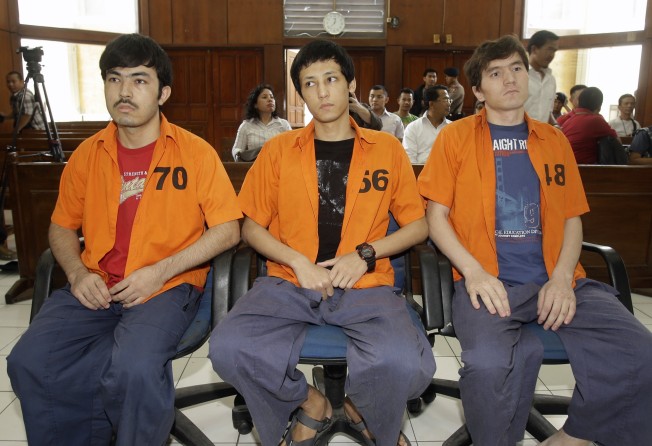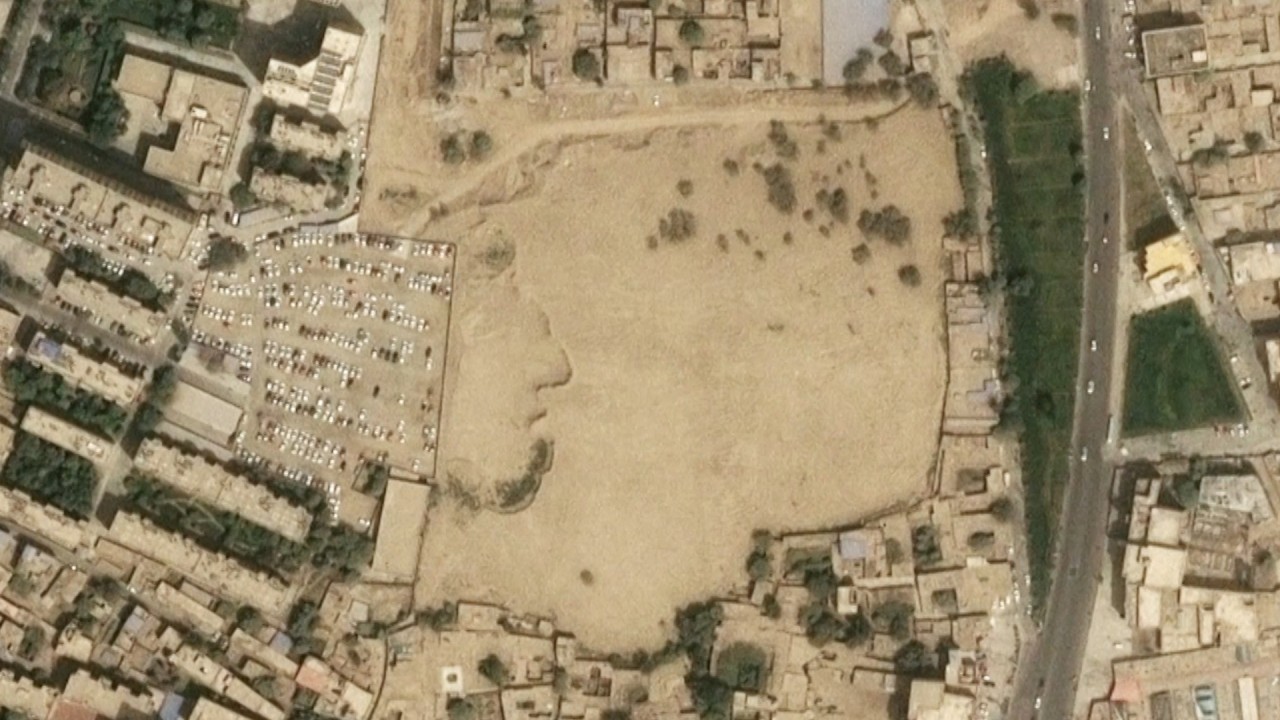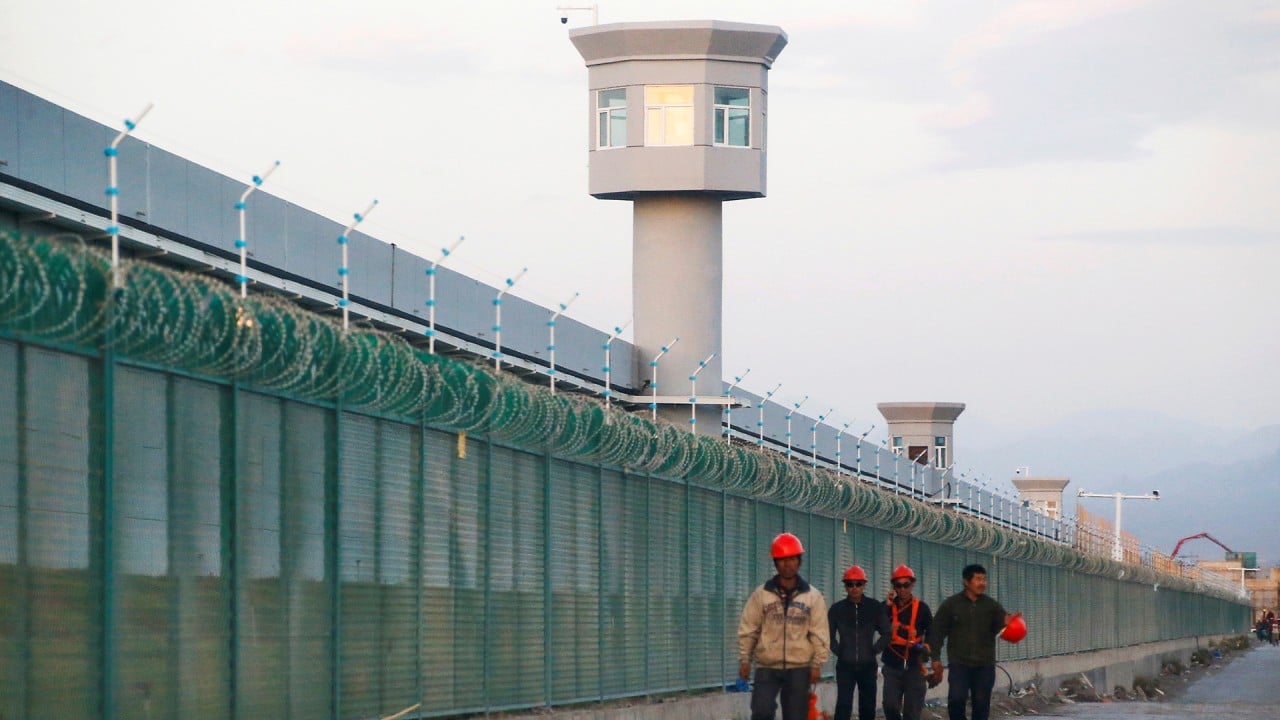
As Uygurs exit Indonesian jail, China-Turkey repatriation tussle brews
- Indonesia jailed three Uygurs in 2015 for attempting to join an Isis-linked terrorist group and entering the country illegally
- The fate of the men, who were holding fake Turkish passports during their trial, remains uncertain

Three Uygurs in Indonesia who were jailed five years ago for attempting to join a local militant group have been freed and are now subject of a repatriation tussle between China and Turkey, said a senior Indonesian security source, sparking fears by rights groups over the men’s safety.
According to Human Rights Watch (HRW), the trio may face dire consequences if returned to China, where “mass arbitrary detention, torture, and mistreatment” of Muslims in Xinjiang province by the Chinese government have been documented.
Beijing considers many Uygurs to be extremists and claims they are dangerous to China’s national security.
A senior Indonesian security source told This Week in Asia that three Uygurs had been released after completing their jail terms, while another two were still serving their sentences.
“Both Beijing and Ankara have asked for them,” the source said, speaking on condition of anonymity due to not being authorised to speak with the press. “Both are pressuring us.”
The source added that Indonesia had yet to make any decision on the fate of the three Uygurs. “Hopefully, by this week [a decision would be made].”
Uygurs, who speak a Turkic language, have sought refuge in Turkey for decades.
In 1952, the Turkish government offered asylum to Uygurs who were fleeing Xinjiang after its takeover by Chinese communists. Turkey has granted some form of temporary or permanent residency to Uygur exiles since then.
Asludin Hatjani, a lawyer who in 2015 represented three Uygur men charged with attempting to join a terrorist group, confirmed they had recently been freed. “But I don’t know where they are now,” he said.
Abdulbasit Tuzer, 26, Ahmet Mahmud, 23, and Altinci Bayram, 32, were each sentenced to six years’ jail and fined 100 million rupiah (US$6,800) for attempting to join the East Indonesia Mujahideen (MIT) group and for entering the country illegally with fake Turkish passports.
Asludin said that during the men’s trial, their identity was Turkish and “therefore they cannot be deported to China”.
The trio was arrested in September 2014 in Poso, Sulawesi, as they sought to meet Santoso, the head of MIT and Indonesia’s most-wanted terrorist at the time.
MIT was the first militant group in Indonesia to pledge allegiance to Islamic State (Isis). Santoso was killed in 2016 during a firefight with security forces.
In Indonesia, they were tried in a court. They might not have legal representatives in China
Asludin also represented a fourth Uygur named Ahmet Bozoglan, who was arrested with the other three and accused of being the leader of the group. He was also jailed for six years for the same charges in 2015.
The men’s citizenship remains unclear. All four Uygurs claimed they were Turkish citizens, and were not from China, but when asked in court to sing the Turkish national anthem, they could not do so, BenarNews reported.
Separately, a fifth Uygur, Nur Muhammet Abdullah, then aged 30, was said to be groomed by pro-Isis Indonesian militants to become a suicide bomber. In 2016, Nur was jailed for six years for bomb-making, conspiring to create terror and plotting a suicide attack on a Shia Muslim community in Bogor, West Java.
In 2016, a spokesman for the Coordinating Ministry of Politics, Law and Security, Agus Barna, told BBC Indonesia the three convicted Uygurs “would not be sent back to China”.

02:31
Satellite images show China has bulldozed Uygur burial sites in Xinjiang
BBC Indonesia quoted an unnamed “senior government official” as saying returning the Uygurs would be “the same as killing them, as there was a big possibility they would be immediately executed”.
Andreas Harsono, a researcher at Human Rights Watch Indonesia, expressed concern the Uygurs would be detained without a trial if deported to China.
“In Indonesia, they were tried in a court. Indonesia’s legal system is not perfect but they were provided legal representation,” Harsono said. “Indonesia also has a free press. Social media is not censored like in China. They might not have legal representatives in China, learning from the horrific treatment against Uygur Muslims in China.”
Apart from Human Rights Watch, other organisations had also provided evidence on the Chinese government’s abuses against Uygur Muslims, Harsono said.
Harsono urged the Indonesian government to help the Uygurs to apply for an asylum via the UNHCR as they had “legitimate concerns” to seek asylum.
“If they want to stay in Indonesia, please give them the working visas. They can speak the Indonesian language. They should be able to work here,” Harsono said.
Mohamad Adhe Bhakti, executive director of the Centre for Radicalism and Deradicalisation Studies (PAKAR), said the trio were part of groups that had first tried to go to Syria from China. “And when they failed to make it to Syria, Indonesian militants in Syria offered them passage to Indonesia and to join militants in Poso … where MIT is among the groups based there,” he said.
At least six Uygurs had also travelled to Poso for paramilitary training in 2015 and became members of MIT. All were killed by Indonesian security forces around 2016. Police said the six had taken part in acts of terror around Poso, including the killing of two local farmers in September 2015, local media reported.

01:54
China hits back at UK claims of forced sterilisations and other human rights abuses against Uygurs
From 2013 to 2016, there was an exodus of thousands of Uygurs fleeing China through Southeast Asia to seek a better life in Turkey, which for the most part went unnoticed by Indonesia, according to a 2019 report by the Jakarta-based Institute For Policy Analysis of Conflict (IPAC).
The exodus was a direct result of the crackdown by Chinese authorities following the July 2009 communal riots in Urumqi, capital of Xinjiang, in which 197 people were killed, according to official Chinese sources. Repression of Uygurs did not start with the riots, but it intensified dramatically afterwards, IPAC said.
The riots and their aftermath led to first a trickle, then a flood of Uygurs leaving home with one goal: to build a new life in Turkey, a nation with linguistic and ethnic ties with Xinjiang. One of the first signs of their determination to use Southeast Asia as a way station was the arrival of 20 Uygurs in Cambodia in December 2009.
“The destinations of choice were Bangkok and Kuala Lumpur, where travellers for a fee could get fake passports, air tickets and contacts,” IPAC said.
The underground network from China took them to Kunming, on the border with Myanmar, through Vietnam, Cambodia or Laos into Thailand and from there to Malaysia.
“There were thus no mass arrivals in, or deportations from, Indonesia playing out in the mass media that would have given the issue more attention,” IPAC said.
“It remains unclear to this day whether one organisation was responsible for all of the above; whether the nerve centre of the operations for sending Uygurs to Indonesia was in Turkey or Syria; and whether, as some sources have suggested, ETIM (East Turkestan Islamic Movement) or Isis had a policy of diverting the ‘overflow’ of Uygurs wanting to go to Turkey to conflict areas of Southeast Asia, where they could get experience that would help them with the struggle at home,” IPAC said.